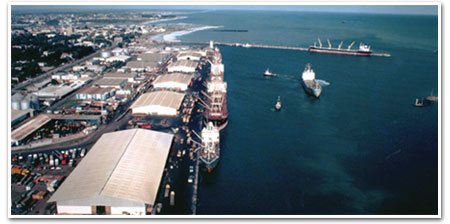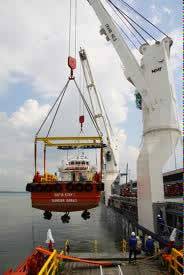Twenty five port operators at middle management level, including four women, from the Port Authority of Cotonou completed their two-week training 27 July in modules 3 and 4 of the UNCTAD/TrainForTrade Modern Port Management Course.
The 25 middle managers make up what will be the 8th graduating class of the UNCTAD/TrainForTrade Port Training Programme in Benin. To date, 122 middle managers from the port community of Cotonou have successfully completed the course.
Port Autonome de Cotonou

Modules 3 & 4 of UNCTAD/TrainForTrade’s Modern Port Management course look at the functioning of a port system and the future challenges to ports. The Modern Port Management course consists of 8 modules that cover the main aspects of managing a port today.
Generally, the full course takes between 18 and 24 months (each port community decides along with TrainForTrade the timeframe of the programme). Overall, the programme represents around 240 hours of training, not including the final assignment.
In order to successfully complete the course and receive the UNCTAD Modern Port Management Certificate, the participants must pass the exams for all modules and write a final thesis (under the supervision of a mentor), which they must successfully defend before a panel of local and international port experts.
The course in Benin was conducted at the training facilities of the Port Authority of Cotonou by 9 senior managers, 6 of whom had been trained as trainers by the UNCTAD TrainForTrade programme.
 As part of this course, the trainees were led on a thorough visit of the port facilities. This allowed middle manager to gain first-hand practical insight into how the separate port facilities function as a whole.
As part of this course, the trainees were led on a thorough visit of the port facilities. This allowed middle manager to gain first-hand practical insight into how the separate port facilities function as a whole.
Often, a middle manager's knowledge and experience of how the port works is limited to his or her specific department.
At the end of Module 3, participants are able to:
- Recognize the operating modes of the various port services as well as the basic principles to be followed to ensure that the port functions effectively and competitively.
- Value the complementary nature that should exist between the various port services in order to improve the overall service quality and reduce costs.
- Understand the basic principle of general cargo and container handling.
At the end of Module 4, participants are able to:
- Identify the port’s main strong points and competitive advantages, as well as its weaknesses and the main opportunities for improvement.
- Appraise the importance of social balances for the good development of the port.
- Recognize the specific problems of the main categories of port personnel;
- Identify the principal sources of danger related to port activities as well as the best way to mitigate the corresponding risks;
- Describe the principal threats to the ecological balance of the port area;
- Describe the stages to be followed and the measures to be taken to lay down and apply an environmental protection policy;
- Describe the different meanings of quality management as well as the stages to be followed and the difficulties to overcome for obtaining the expected results.
To date, over the past 20 years, a total of 876 middle managers have been trained and certified worldwide under the TrainForTrade Port Training Programme.
A total of 587 'trainers' have been trained from all regions, i.e. senior port managers trained by UNCTAD/TrainForTrade as trainers or technical tutors.


